Paradisaea
The genus Paradisaea consists of seven species of birds-of-paradise (family Paradisaeidae). It also contains the subgenus, Paradisornis, assigned only to the blue bird-of-paradise. The genus is found on the island of New Guinea as well as the nearby islands groups of the Aru Islands, D'Entrecasteaux Islands and Raja Ampat Islands. The species inhabit a range of forest types from sea level to mid-montane forests. Several species have highly restricted distributions, and all species have disjunct distributions.[1] A 2009 study examining the mitochondrial DNA of the family found that the Paradisaea birds-of-paradise were in a clade with the genus Cicinnurus. It showed that the blue bird-of-paradise was a sister taxon to all the other species in this genus.[2]
| Paradisaea | |
|---|---|
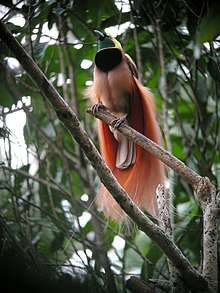 | |
| Raggiana bird-of-paradise (Paradisaea raggiana) | |
| Scientific classification | |
| Kingdom: | Animalia |
| Phylum: | Chordata |
| Class: | Aves |
| Order: | Passeriformes |
| Family: | Paradisaeidae |
| Genus: | Paradisaea Linnaeus, 1758 |
| Subgenera | |
| |
All are large, and sexually dimorphic. The plumage of the males includes characteristic grossly elongated flank plumes (which emerge from beneath the wings and strictly speaking are flank plumes pectoral plumes), and a pair of wire-like feathers emerging from the end of the tail. The flank plumes are used during breeding displays.[1]
The name, Paradisaea, is the Latinized form of "paradise". The local name in Indonesia is cenderawasih.
Species
| Subgenus | Image | Common name | Scientific name | Distribution |
|---|---|---|---|---|
| Paradisornis | Blue bird-of-paradise | Paradisornis rudolphi | East-Central and Southeastern New Guinea, mostly in altitudes of 1400-1800 m. | |
| Paradisaea | 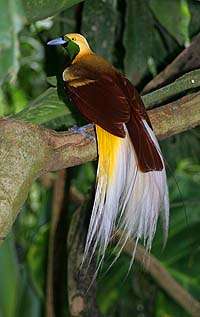 |
Lesser bird-of-paradise | Paradisaea minor | Most of Northern, Northwestern and Western New Guinea (nominate race found also on Misool and other nearby islands.), also Eastern New Guinea near the Huon region; found at altitudes from 0-1500 m. |
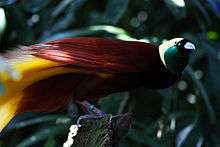 |
Greater bird-of-paradise | Paradisaea apoda | Southwestern and southern New Guinea, as well as the Aru Islands; found at altitudes around 900-950 m. | |
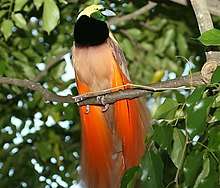 |
Raggiana bird-of-paradise | Paradisaea raggiana | Most of South, East-Central, Eastern and Southeastern New Guinea; typically found around at 1500 m in altitude. | |
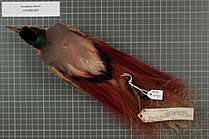 |
Goldie's bird-of-paradise | Paradisaea decora | Fergusson and Normanby islands in the D’Entrecasteaux Archipelago located Southeast of New Guinea; found at lower altitudes than other Paradisaea members. | |
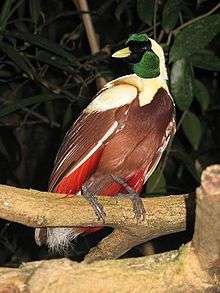 |
Red bird-of-paradise | Paradisaea rubra | Waigeo and Batanta islands of Raja Ampat in West Papua at altitudes of around 550-600 m. | |
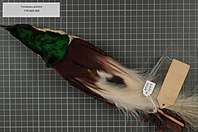 |
Emperor bird-of-paradise | Paradisaea guilielmi | Mountains in the Huon Peninsula in Northeastern New Guinea; commonly found at altitudes of 1300-1500 m, though can be found lower at 400-670 m. | |
References
| Wikimedia Commons has media related to Paradisaea. |
| Wikispecies has information related to Paradisaea |
- Firth, Clifford B.; Firth, Dawn W. (2009), "Family Paradisaeidae (Birds-of-paradise)", in del Hoyo, Josep; Elliott, Andrew; Christie, David (eds.), Handbook of the Birds of the World. Volume 14, Bush-shrikes to Old World Sparrows, Barcelona: Lynx Edicions, pp. 404–459, ISBN 978-84-96553-50-7
- Irested, Martin; Jønsson, Knud A; Fjeldså, Jon; Christidis, Les and Per GP Ericson (2009). "An unexpectedly long history of sexual selection in birds-of-paradise". Evolutionary Biology. 9 (235). doi:10.1186/1471-2148-9-235. PMC 2755009. PMID 19758445.